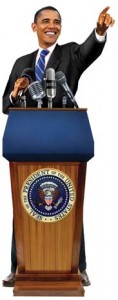As a professor of political communication, I find it fascinating that one of the most common negative criticisms of President Barack Obama by pundits and politicians is that he is too “professorial.”
Personal tone and style have always affected the public’s attitudes toward its leaders. From speeches by Pericles in Athens to Franklin D. Roosevelt’s fireside chats via radio, and, more recently, tweets from Mayor Cory Booker of Newark, N.J., during one of this winter’s Northeast blizzards, it’s clear that successful mass communication is that which best approximates successful personal communication. The politicians we call “great communicators” are those who can reach a person standing in a gigantic plaza, watching at home on television, or even reading an article shared on Facebook, and make that person feel (in the proverbial language of the focus-group response) as if they were “talking to me personally.”
That said, what exactly is wrong with being professorial?
The intellectual distance and aloofness of some professors is often exaggerated as the signature characteristic of a profession practiced by tens of thousands of individuals in different ways every day. I do know aloof scholars. But I also know charismatic and charming ones. And rather than protest against a stereotype, I’d like to offer a counterargument: We would live in a better world if our political leaders were more professorial. Why? Because among good professors:
Facts matter. Take a familiar tale from academe: A professor is contacted by a legislative staff member to get information on a topic on behalf of a politician. The professor soon discovers that facts are of minor importance, and that the staffer is interested only in those numbers, quotes, or cases that support the position already held by the politician, and will ignore any that contradict it. Instead of taking stances and making decisions based on careful investigation, as academic researchers do, politicians usually take stands based on cherry-picked research and pre-approved talking points that echo existing party ideologies and pander to donors and voting constituencies.
The best scholarly research allows for being wrong. Hypotheses are proposed. Evidence accumulates. Scientific consensus evolves. Young scholars, and not a few senior ones, raise new ideas. Heresies become orthodoxies, and in time they, too, are often modified or overturned. Scholars can admit the limitations of their knowledge when answers are elusive. Politicians, on the other hand, seem incapable of saying “I don’t know” in response to any question.
Arguments involve facts, not spin. Good scholars don’t spin. A professor may certainly make the case to her colleagues or students that one theory best explains known facts. But unlike politicos, faculty members spend their time worrying about methodologies, not persuasive strategies. Professors don’t conduct focus groups and audience testing, or devise sound bites and slick videos to cloak their most ridiculous policy positions and campaign promises with clever slogans, buzzwords, optics, or metaphors. Professors don’t think, “My research is pleasant to the ear and appealing to the emotions, so facts be damned.” We adhere to an ancient wisdom: The Book of Job castigates those who would “darkeneth counsel by words without knowledge.”
Playing “gotcha” is rare and frowned upon. When a colleague—or a student, for that matter—misspeaks and accidentally makes some preposterous claim, only the most churlish pedagogue will mock, pounce on the mistake, and cite the error as proof that his “opponent” should be dismissed completely. But politics, as practiced these days by politicians and polemical commentators, is one long trivial game of gotcha. Anything—even the slightest infelicitous word choice—that can be twisted negatively by an opponent is used for the next attack ad or ranting op-ed.
It’s fine to be partisan about ideas, but governing must be collaborative. Professors can be passionate and sometimes argumentative. They can believe with fervor in a theory of society, or even on whether to install blackboards or whiteboards in a new classroom. But every day, on thousands of campuses, millions of students are educated without any disruption by academic partisanship. There is no filibustering. More than in any other trade, professors will sit down, work together with people with whom they hold deep ideological differences, and get the job done.
Call it aloofness if you must, but the truth is that contemplative, thoughtful, evidence-seeking research, conducted for the purpose of finding answers rather than scoring political points, would better serve our country than puffery, posturing, and cant. As a political consultant I know observed, “People want black and white, but we have so many problems that are gray.” We need to stop feeding the general dysfunctional tendency toward oversimplifying complex problems and admit that difficult issues must be handled by smart and reflective people.
I realize that in this essay I have employed the conceit of contrasting the best professors with the worst politicians. In truth, I have met and known many people in the political class who are brilliant, honest, and dedicated to the commonweal. I have met and heard of faculty members who are unprincipled and self-serving. My point, however, is that the best characteristics of the best professors can be of great service to the country, and we should encourage and reward them in our leaders, not mock them.
Being professorial is not a bad thing if it accomplishes good things. It’s an idea worth thinking about.
David D. Perlmutter is director of the School of Journalism and Mass Communication and a professor at the University of Iowa. He is the author of Blogwars (Oxford University Press, 2008).
